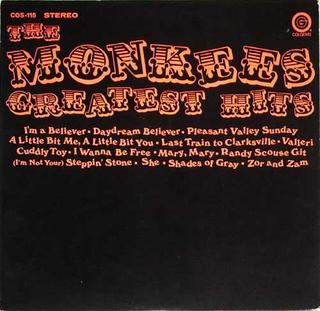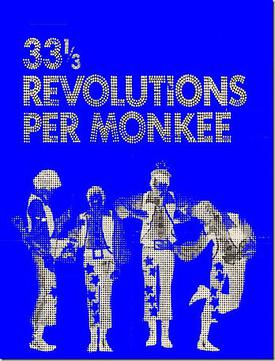Related Research Articles

The Monkees were an American pop rock band formed in Los Angeles in the mid-1960s. The band consisted of Micky Dolenz, Davy Jones, Michael Nesmith, and Peter Tork. Spurred by the success of the television show of the same name, the Monkees were one of the most successful bands of the late 1960s. With international hits, four chart-topping albums and three chart-topping songs, they sold more than 75 million records worldwide.

Pisces, Aquarius, Capricorn & Jones Ltd. is the fourth album by the Monkees. It was released on November 6, 1967, during a period when the band exerted more control over their music and performed many of the instruments themselves. However, although the group had complete artistic control over the proceedings, they invited more outside contributions than on their previous album, Headquarters, and used session musicians to complement their sound. The album also featured one of the first uses of the Moog synthesizer in popular music. Pisces, Aquarius, Capricorn & Jones Ltd. sold over three million copies. It was the band's fourth consecutive album to reach No. 1 on the U.S. Billboard 200.

Headquarters is the third studio album by the American pop rock band the Monkees, released in 1967 by Colgems Records. It was issued after the first season of their television series had concluded and was the first album on which the group members made substantial songwriting and instrumental contributions, rather than relying on session musicians and professional songwriters. After a struggle for creative autonomy with their record label, the group had been allowed, to a degree, to record by themselves. Headquarters became the group's third consecutive No. 1 album on the Billboard 200 chart and was certified double platinum in the United States with sales of more than two million copies within the first two months of release. It also peaked at No. 2 on the UK charts. It is included in the 2006 book 1001 Albums You Must Hear Before You Die.

The Monkees is the debut studio album by the American band the Monkees. It was released on October 10, 1966 by Colgems Records in the United States and RCA Victor in the rest of the world. It was the first of four consecutive U.S. number one albums for the group, taking the top spot on the Billboard 200 for 13 weeks, after which it was displaced by the band's second album. It also topped the UK charts in 1967. The Monkees has been certified quintuple platinum by the RIAA, with sales of over five million copies.

The Monkees Present is the eighth studio album by the American pop rock band the Monkees, released in 1969 by Colgems Records. It was the second Monkees album released after the departure of Peter Tork and the last to feature Michael Nesmith until 1996's Justus.

Changes is the ninth studio album by the American pop rock band the Monkees, released in 1970 by Colgems Records. The album was issued after Michael Nesmith's exit from the band, leaving only Micky Dolenz and Davy Jones to fulfill the recording contract they had signed in the mid-1960s. Changes was their last new album for Colgems Records and the group's last album of all new material until Pool It!, released in 1987.

Pool It! is the tenth studio album by American pop rock band the Monkees, released in August 1987 by Rhino Records. It was the first Monkees studio album of new material since Changes in 1970 and the first Monkees album to feature Peter Tork since the 1968 Head soundtrack.

The Birds, the Bees & the Monkees is the fifth studio album by the American pop rock band the Monkees, released in 1968 by Colgems Records. It was the first album released after the cancellation of their TV show and subsequently was their first not to reach No. 1 on the U.S. Billboard 200, peaking at No. 3, and their first not to chart in the UK, with their four previous efforts all having reached the top ten. The album has sold over a million copies.

Head is the sixth studio album by the American pop rock band the Monkees, released in 1968 by Colgems Records, and the soundtrack to the film of the same name. The album primarily consists of musique concrète pieces assembled from the film's dialogue, while the six new songs encompass genres such as psychedelic music, lo-fi, acid rock and Broadway theatre.

Instant Replay is the seventh studio album by the American pop rock band the Monkees, released in 1969 by Colgems Records. Issued 11 months after the cancellation of the group's NBC television series, it is also the first album released after Peter Tork left the group and the only album of the original nine studio albums that does not include any songs featured in the TV show.

"Daydream Believer" is a song composed by American songwriter John Stewart shortly before he left The Kingston Trio. It was originally recorded by the Monkees, with Davy Jones singing the lead. The single reached No. 1 on the U.S. Billboard Hot 100 chart in December 1967, remaining there for four weeks, and peaked at No. 5 on the UK Singles Chart. It was the Monkees' third and last No. 1 hit in the U.S.

The Monkees Greatest Hits is the first greatest hits compilation album by the American pop rock band the Monkees, released in 1969 by Colgems Records.

33+1⁄3 Revolutions per Monkee is a television special, starring the Monkees, which aired on NBC on April 14, 1969. The musical guests on the show included Jerry Lee Lewis, Fats Domino, Little Richard, the Clara Ward Singers, the Buddy Miles Express, Paul Arnold and the Moon Express, and We Three in musical performances. It was produced by Jack Good.

Missing Links Volume Three is a compilation album of rare and previously unreleased songs by the American pop rock band the Monkees, issued by Rhino Records in 1996. It is the third and final volume of a three-volume set, preceded by Missing Links in 1987 and Missing Links Volume Two in 1990.
"Star Collector" is a song written by Gerry Goffin and Carole King in 1967 and recorded by The Monkees. The song is included on their fourth album Pisces, Aquarius, Capricorn & Jones Ltd. It was featured in five second-season episodes of their television series: "The Wild Monkees", "Hitting the High Seas", "Monkees Watch Their Feet", "Monkees in Paris" and "Monkees Mind Their Manor". "The Wild Monkees" uses an early mix of the song, and the other episodes use the released mix.
Stranger Things Have Happened is a 1994 album by former Monkees member Peter Tork. Although he had been performing since the 1960s, this was his first and only solo release.

The Headquarters Sessions is a compilation album by the American pop rock band the Monkees, released in 2000 by Rhino Handmade. It contains 84 tracks on three CDs, including 60 previously unreleased recordings from the sessions that produced the band's third album, Headquarters (1967).

Good Times! is the twelfth studio album by American pop rock band the Monkees. Produced primarily by Adam Schlesinger, the album was recorded to commemorate the band's 50th anniversary. It is the first Monkees studio album since Justus (1996), marking the longest gap between releases to date, and the first since the death of Davy Jones. The album features surviving Monkees Micky Dolenz, Michael Nesmith, and Peter Tork, as well as a posthumous contribution from Jones.

Christmas Party is the 13th and final studio album by the American pop rock band the Monkees, released on October 12, 2018, by Rhino Records. Produced mainly by Adam Schlesinger, the album is the Monkees' first to focus on Christmas themes. It follows on the success of their 2016 album Good Times! The album features surviving Monkees Micky Dolenz, Mike Nesmith, and Peter Tork, as well as two posthumous contributions from Davy Jones. It is the final Monkees studio album to be released prior to Tork and Nesmith's deaths in 2019 and 2021, respectively.
"Words" is a song written by Tommy Boyce and Bobby Hart and released by the Monkees. An early version by the Leaves appeared on their 1966 album Hey Joe. The Monkees first recorded the song for their second album, More of The Monkees, in August 1966 under the supervision of Boyce and Hart. While this version went unreleased until the 1990 compilation Missing Links Volume Two, it was featured in the 10 April 1967 episode of The Monkees "Monkees, Manhattan Style". A new version of the song was made to be the B-side of "Pleasant Valley Sunday" in 1967, now produced by Chip Douglas.
References
- ↑ Masley, Ed (January 7, 2024). "Best Monkees songs of all time: 30 classics, from their biggest hits to album tracks". The Arizona Republic . Retrieved January 12, 2024.
- ↑ "Show 44 - Revolt of the Fat Angel: Some samples of the Los Angeles sound. [Part 4]". UNT Digital Library.
- ↑ "Shades of Gray" video. YouTube. Retrieved on December 17, 2016.
- ↑ "Chart Spotlight –Predicted to reach the HOT 100". Billboard. December 31, 1966.
- ↑ "The Monkees - Barrel Full Of Monkees (1971, Vinyl)". Discogs.com. 1971.
- ↑ "The Monkees – Re-Focus (1972, Vinyl)". Discogs . 1972.
- ↑ Shades of Gray at AllMusic
- ↑ "The Sons of Champlin - Fat City". Amazon.com. 1999.
- ↑ "Various - Through The Looking Glass: Indie Pop Plays The Monkees". Discogs.com. October 2000.
- ↑ Sandoval, Andrew (2005). The Monkees : the day-by-day story of the '60s TV pop sensation. Internet Archive. San Diego : Thunder Bay Press. pp. 114-115 297. ISBN 978-1-59223-372-4.